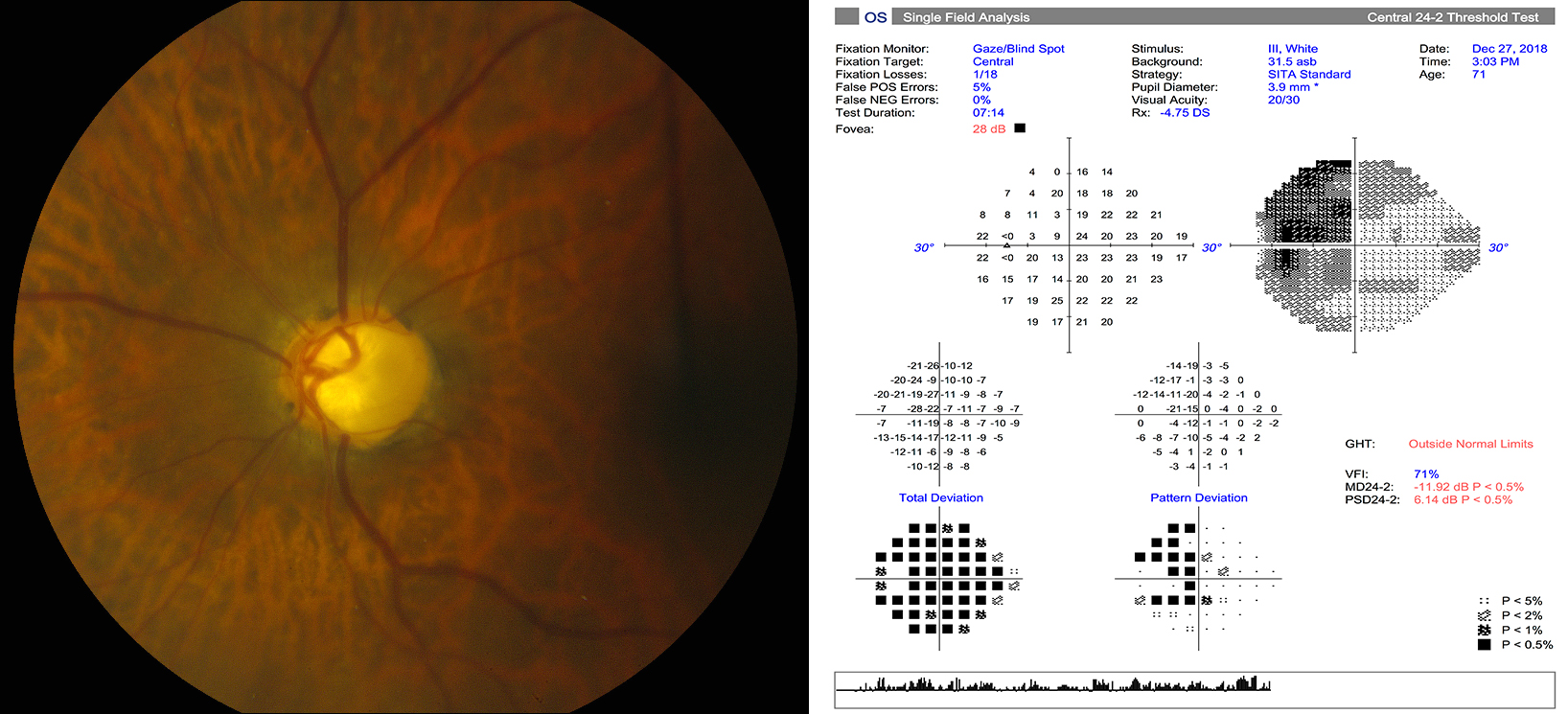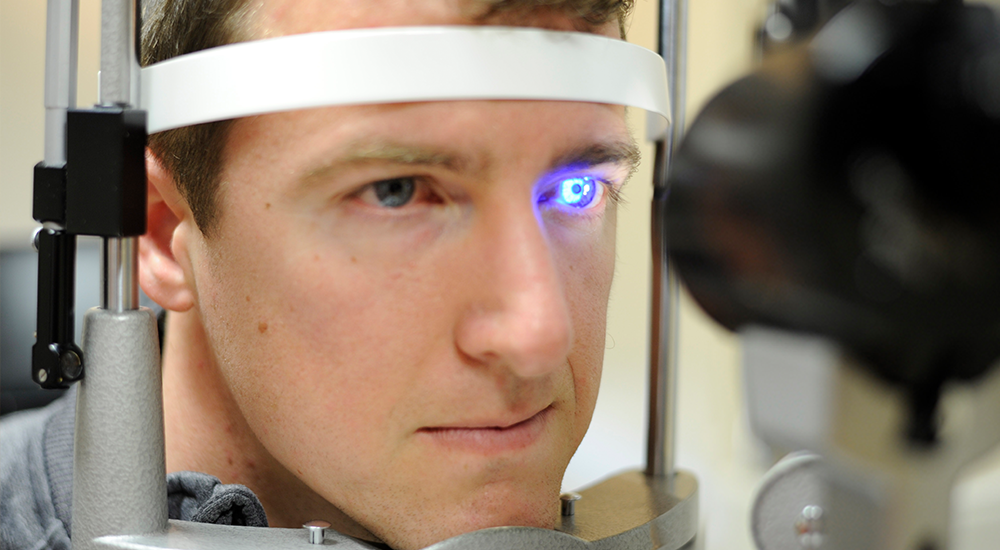What is glaucoma?
Glaucoma is a disease that damages your eye’s optic nerve. It usually happens when fluid builds up in the front part of your eye. That extra fluid increases the pressure in your eye, damaging the optic nerve.
However, some forms of glaucoma can damage the optic nerve, even when the eye pressure is in the normal range during the eye exam. This can happen when the eye pressure becomes high at other times of the day and the patient does not feel the pressure elevation. It can also happen when blood flow to the optic nerve becomes reduced below a critical level, which can happen during periods of very low blood pressure, even during sleep.
For example, in some patients who take their hypertension medications right before bedtime, it can cause the blood pressure to drop too low during hours of sleep. Another risk factor that can adversely affect glaucoma is obstructive sleep apnea, which may also reduce the delivery of oxygen to the optic nerve
Glaucoma is a leading cause of blindness for Veterans over 60 years old. But blindness from glaucoma can often be prevented with early treatment.
Look at this example of what your vision would be like with glaucoma.
Here is a very helpful video by VA’s Dr. Dan Bettis which answers some of the common patient questions about glaucoma. Please take five minutes and watch it with your family.
Click here for a very detailed patient’s guide to information about the disease.
Veterans enrolled in VA health care can schedule appointments directly with Ophthalmology or Optometry without a referral from primary care.
Schedule an eye exam at your VA health care facility.

In the photos above, the left figure shows a retinal digital photograph of the retina and optic nerve from the left eye of a glaucoma patient. It shows the excavation (cupping) of the optic nerve caused by glaucoma. The right figure is the report from the visual field test from the same eye showing extensive areas of damage in the visual field due to severe glaucoma that was diagnosed late in its course.
VA research provides valuable tools for vision treatment
VA is at the forefront of vision research and glaucoma is one of our top priorities. A current study by Dr. Markus Kuehn is a Bioassay to Predict the Development and Progression of Glaucoma, sponsored by the VA Rehabilitation, Research, and Development Division.
The project makes use of our recent discovery that glaucoma is associated with the development of a cellular autoimmune response that can further reduce vision. The investigators are testing if the strength of the reaction is predictive of future loss of vision and quality of life of the patient.
Early identification of patients at high risk to develop vision loss allows more aggressive treatment before the damage occurs. The development of a predictive assay would provide ophthalmologists with a valuable tool and preserve the quality of life for Veterans.
Dr. Kuehn is a professor in the Department of Ophthalmology and Visual Sciences at the Iowa City VA Center for Prevention and Treatment of Visual Loss.
Here is an earlier study that suggests stem cells could ward off glaucoma.
Risk higher for African Americans
Approximately 2.2 million Americans have been diagnosed with glaucoma and the prevalence of the disease will rise to a projected 3 million by 2020.
The prevalence of glaucoma is three times higher in African Americans than in non-Hispanic whites. Additionally, the risk of visual impairment is higher and the age of onset is earlier than in whites.
Topics in this story
More Stories
Bob Jesse Award celebrates the achievements of a VA employee and a team or department that exemplifies innovative practices within VA.
The Medical Foster Home program offers Veterans an alternative to nursing homes.
Watch the Under Secretary for Health and a panel of experts discuss VA Health Connect tele-emergency care.







have had glaucoma since I was 35,am now 75-should get VA appt.
I’m a Veteran of the Vietnam war. How can I become a member of the VA Health Care.
I would like to know who I could talk to about Agent Orange. I was diagnosis with it by the VA Hospital in Elsemere, DE.
Some Vets have tod me that I can’t do anything with it because it was settled but no one told me by mail phone or smoke signals. Can you direct me.
Thanks you,
Michael A. Louth
Michael, first off, thank you for your service. The very first step in obtaining access to your VA Health Benefits is to apply for enrollment. Visit https://www.vets.gov/healthcare/apply to apply online. Or call our toll-free hotline at 1-877-222-VETS (1-877-222-8387). You may call the Agent Orange Help Line at 1-800-749-8387 or send an email to GW/AOHelpline@vba.va.gov. Additional information can be found here: https://www.va.gov/disability/eligibility/hazardous-materials-exposure/agent-orange/
Go speak with someone at DAV or the American Legion. Those guys will help you and send you in the right direction. Don’t try to do it by yourself. Good luck.
I would like to know more about treatment for glaucoma treatment thru the VA.
Randy, if you are enrolled in VA health benefits we encourage you to talk to your provider to discuss the treatment options that are best for you if you have been diagnosed with glaucoma. This page does not provide individual medical advice, diagnosis, or treatment.
Where can I research Cataracts
Here’s a VA research page on vision loss which covers cataracts as well: https://www.research.va.gov/topics/visionloss.cfm?_ga=2.32319545.662185304.1546871719-2038028968.1542723036. Your VA primary care team at the facility is ultimately responsible for managing all aspects of you care.
I have glaucoma. The VA is giving me Brimondine Tartrate and Lananoprost. I was scheduled for cataract surgery but am having a tough time breathing. I cough up lumps of phlegm. Cannot be done until this is corrected. The VA is working on that. I have appointments upcoming.